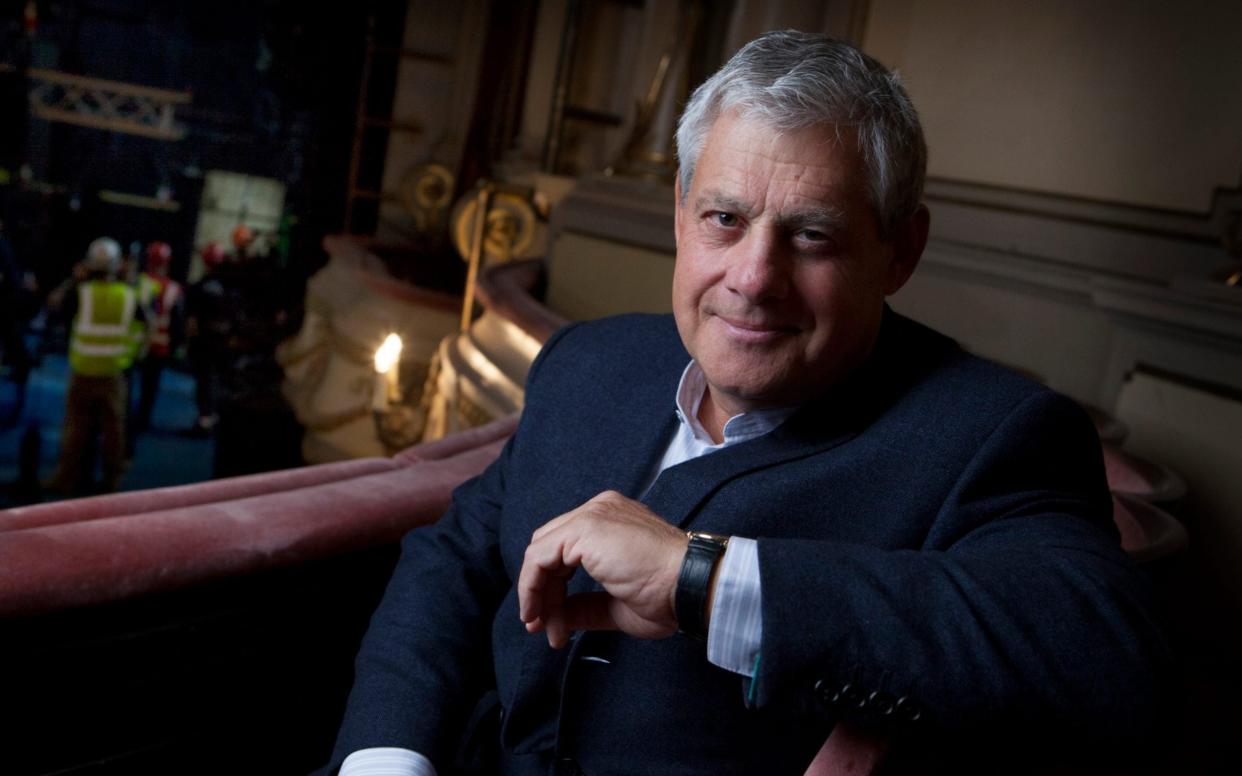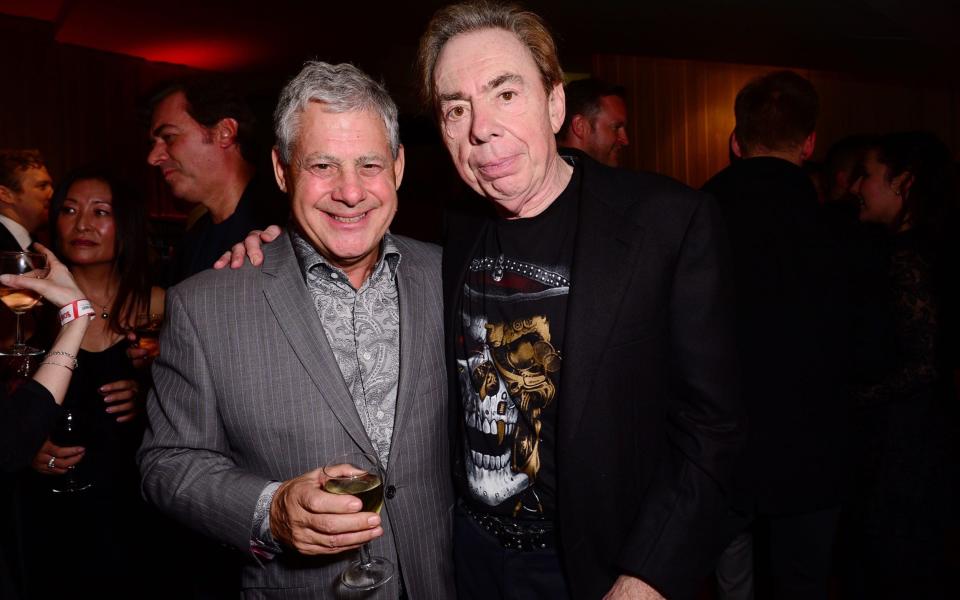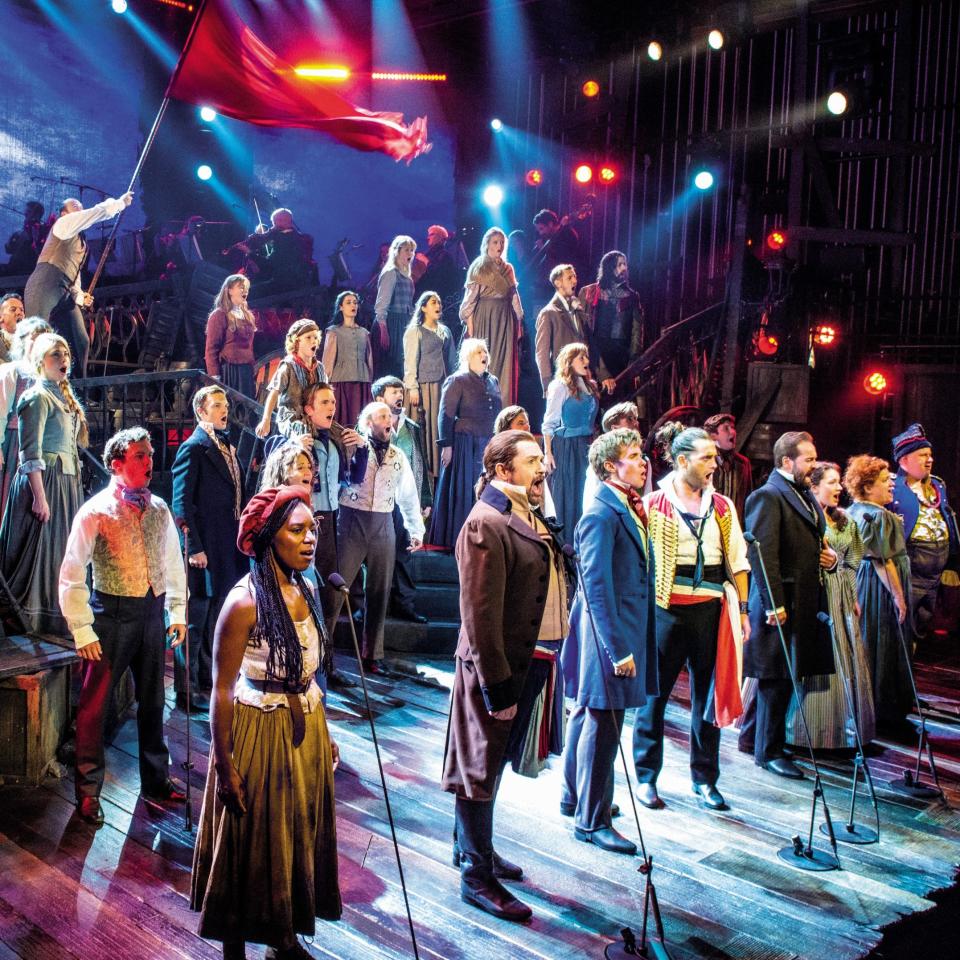Cameron Mackintosh interview: I predicted disaster for theatre and I have proved to be an oracle

For a few magical minutes at the start of this month, it was as if the West End had been reborn amid a surprise party. At the finale of Britain’s Got Talent, viewers were treated to a showcase of Mary Poppins, The Phantom of the Opera and Les Misérables, the latter concluding the socially distanced jamboree with the rallying cry “One show more!”
The icing on the cake was the entrance of Sir Cameron Mackintosh. The producer of these copper-bottomed hits explained the teasing rejig of One Day More, announcing the return of Les Mis in its concert form in time for Christmas. It was pure theatre, powered by huge passion.
Mackintosh, 74, delivered what he now reveals was a departure from the prepared script, having worked up to the last minute to pull the occasion together. Looking into the camera, he said: “Let’s hope this is inspirational to the Government to re-open our theatres by next Spring.”
As he shows me round the Sondheim (freshly modified to make it Covid-secure, with capacity reduced from more than a thousand to 750) he tells me: “I was saying it because I passionately felt it.” He was moved to tears by the first run-through that day – “I was choked up”. Will his statement make a difference?
He hopes so. While aware of the shifting, complex nature of the pandemic – “It’s like making decisions in a swamp” – he wants to impress on Culture Secretary Oliver Dowden the need to find out before Christmas whether theatre can return without social distancing, if Spring is to be a viable option. It can take four months to get the kind of long-runner found at his eight theatres – Hamilton, Dear Evan Hansen and The Book of Mormon included – back on its feet.
For a man who has devoted himself to showbusiness for half a century, it has been a peculiar agony to be starved of the tangible fruit of his raison d’être. “Let’s not make it melodramatic, however when you wake up in the night, the fact that you feel you can’t do what is necessary stays in your head all the time – I’ve spent my life doing what I wanted to do and mostly successfully.”
After calling early in the crisis for the Government to provide financial support, and bewailing the ruinous effect of social distancing, Mackintosh was eclipsed in the battle to get theatres reopened by Andrew Lloyd Webber. The latter, swift to conduct socially distanced trials at the Palladium and generally keeping theatre’s plight in the spotlight, became the hero of the summer.
Confusion also reigned momentarily over the fate of Phantom. In July, the original London incarnation (produced by Mackintosh) was announced to be closing, reportedly indefinitely, only for Lloyd Webber, its composer (and owner of Her Majesty’s), to vow, as if in defiance: “Phantom will be back”. With producer and theatre owner Nica Burns announcing the reopening of her venues last month despite the absence of a government insurance scheme, the ball was in Mackintosh’s court.
He has duly delivered by re-emerging with his Les Mis concert, but not before an unfavourable impression of his modus operandi took hold. “Every time I interview someone in theatre the same question keeps coming up: where’s Cameron Mackintosh?” commented the arts correspondent of one Sunday newspaper, in a comment beneath his own coverage of Burns’s news.
Against the charge of putting his feet up, while everyone else sings for their supper, he’s adamant he has been working tirelessly behind the scenes. “What I’m focused on is getting the full stage shows back. Andrew did a great job but it didn’t need all of us to do that.”
He clarifies the situation with Phantom, suggesting there was no need for himself and Lloyd Webber to be painted as being at variance, something he partially attributes to the latter’s occasional reticence about his hand in producing decisions. “Before lockdown we opened a fabulous new production in Leicester, which Andrew came to see – and it’s going to go into Her Majesty’s. His company is the co-producer. It was just Andrew being ‘the artist’. When it suits him he’s the lonely artist and when he wants to put on a show he’s the showman. He has always been like that. I just get on with things.”

Mackintosh’s workforce has been decimated by Covid. Altogether, 627 personnel were made redundant across his two main companies – Delfont Mackintosh Theatres (which oversees the venues) and Cameron Mackintosh Ltd (the producing arm), with 583 London and UK touring production artists, musicians and technical staff laid off too. There was criticism in some quarters, reported in The Stage, that more could have been done and the process could have been better handled.
Comparing his pre- and post-Covid operation with that of the other West End theatre owners now, he avows that he has still “got more people working for me than anyone else”.
Does he have regrets? “I don’t have any regrets,” he replies. “My only regret is that theatre has been put in this position. The whole thing has been very sad. The fact is that at the beginning I said I feared we wouldn’t be up until next year – and I went from being a bit of a Cassandra to the oracle, because I’ve been proved right. I think we’ve done the best that we can. There’s bound to be someone who feels we could have done more, but the number of people who’ve written to us to say ‘thank you’, understanding the difficulty we’re in, has been enormous. If I had kept on the many hundreds of people I had to let go it would have drained and destabilised my business and I might have had to sell off parts of it. Maybe some people would like me no longer to be working in the theatre, but I think I have tried to be a force for good, and am working to make the West End alive again.”
There’s an assumption, ubiquitous on social media, that Mackintosh – estimated to be worth £1.24 billion in the 2020 Sunday Times Rich List – has it very easy compared with those rendered out of work.
He understands the sniping about his billionaire status but protests: “The fact is that the public are sitting on my vaults of money – they’re in the fabric of the buildings, that’s where the money has gone. Yes, I’m bloody well off and if everything went, I’m not going to be joining Oliver in the workhouse. But my money is rapidly being used up to keep all this going.”
Ineligible for a grant from the Culture Recovery Fund (because his organisation isn’t at breaking point) and reluctant to take a government-backed loan (preferring his own means of obtaining credit), he still wonders aloud – a touch of exasperation entering his generally ebullient tone – as to why the Government can’t support theatre-owners more.

“It isn’t right. What is not a level playing field is who is getting subsidised for what. It seems to me that they [the Government via the Arts Council] have helped a good range of subsidised and non-commercial theatre but there is no rhyme or reason yet as to what they’re supporting in the West End. This is infrastructure that belongs to the nation – we’re the caretakers for future generations. These are the engine rooms of the West End. We pump money into the wider economy.” He has contributed £1 billion in tax over the years, he says, pointing out that it costs £250,000 a week just to keep his theatres maintained while dark. Most of his theatres are larger than those belonging to Nimax (Burns’s company); he can’t replicate her approach of reopening on a small scale, even if he wanted to.
Besides, he argues: “The theatre as we know it will not survive unless the big shows get back up. However many other shows there are on the periphery, the major shows are the symbol that we’re open for business.”
The threats of a deferred full reopening are many. “The longer it goes on, the bigger the bills. If it pushes through to autumn or the following year, I don’t know where we will be. I could get through to the spring of 2022, but to add another year would be very serious. I can’t say what I would do at that point.”
Mackintosh is nothing if not a fighter, and just as he wants his audience to trip out into the streets on a high, he wants to deliver something upbeat, by way of a parting shot. “Yes, as I hit my 75th year I’m going “Oh my God, how much longer can I keep this going?”, but at the moment I still have my mojo. I absolutely can see the West End back next year, but it needs to be back as part of the crusade of getting London exciting again, as part of the cure, not post the cure.
“We need theatre to rally. It’s the reason why Churchill reopened the theatres at the beginning of the Second World War – he went ‘We have to reopen come hell or high water’. That’s the kind of pluck we need now.”
The DVD of Les Misérables: The Staged Concert will be available from Mon; the cast soundtrack is released on Nov 20; a new live cast recording of Mary Poppins is also released on Nov 6. The Staged Concert runs 5 Dec to 31 Jan (returns only) at the Sondheim: cameronmackintosh.com


